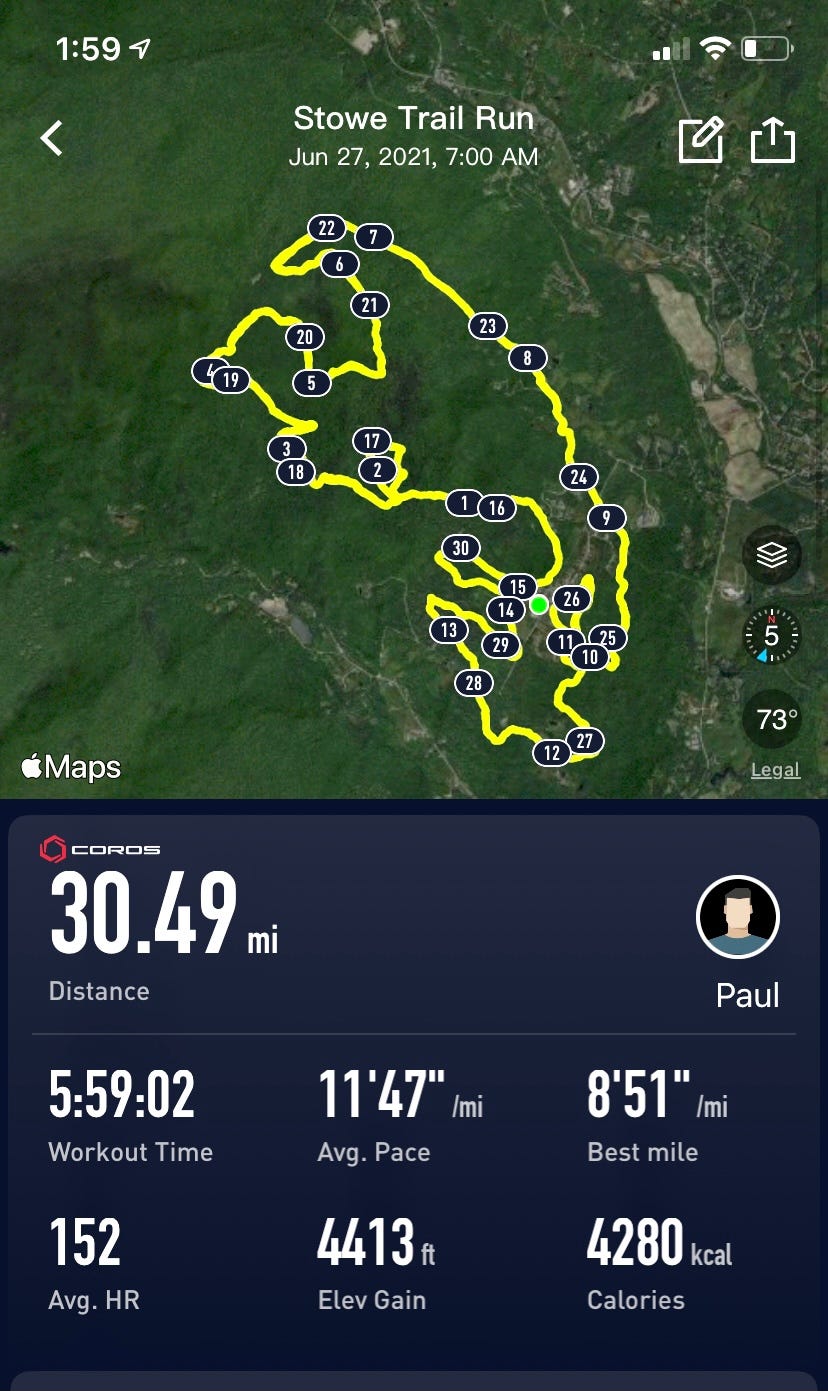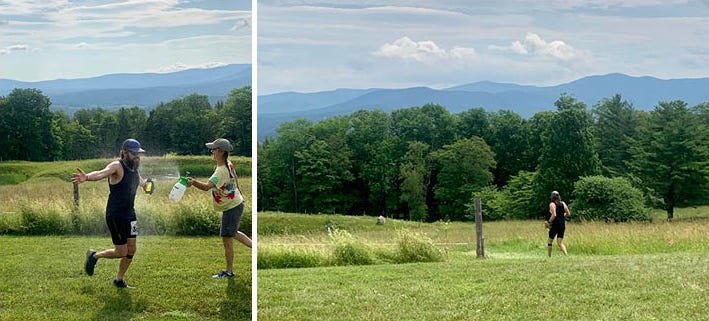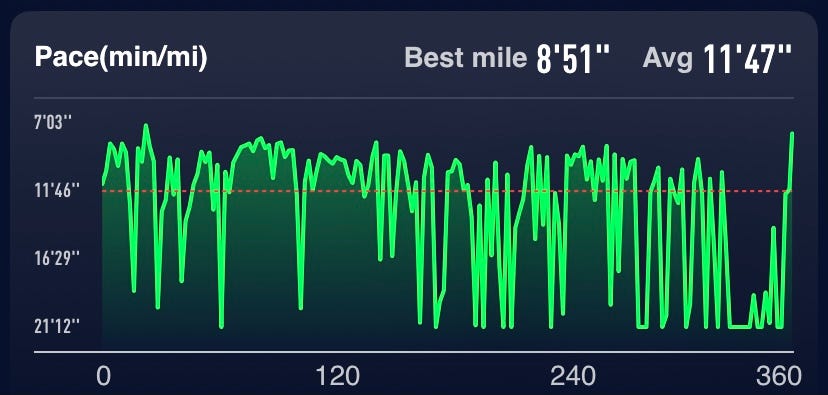STOWE, Vt. -- There’s a picture of me at the end of the Catamount Ultra that is quite gruesome. I’m lying on my back in the grass wearing nothing but lycra shorts that are grafted onto my body like a second layer of skin, and a hat that is filled with ice. My hands are covering my face so it’s impossible to see whether I’m grimacing or crying, but there’s a decent chance I’m doing both.
That picture explains so much of what I’m about to tell you, but my wife/creative director advised me not to post it on the grounds of — “Nobody needs to see that” — so the description above will have to suffice.
It’s hard to talk about a race like this with normal people without sounding like you’re whining, bragging, or both. But you are not normal. You are runners, and I trust that you will understand everything I’m about to tell you.
If you are not a runner, I’ll state right here for the record that I’m not whining, complaining, or lamenting anything. I’m certainly not bragging. I’m just telling you how it was when the temperatures soared and I melted down.
So, let’s leave that image of me belly up in the dirt at the finish line aside for a minute. Trust me, it’s not going anywhere. Besides, that wasn’t the end of this story. It was the coda. The end came much earlier, which is where we’ll pick things up around Mile 26.
I was coming out of the woods into an open field in the direct path of the sun when I first thought about quitting. My stomach was doing cart wheels, my legs felt like jelly, and despite being only five miles from the finish, my motivation was non-existent.
I’ve never quit a race before, but it was hot. Really hot. Upper 80s, maybe low 90s. Tons of humidity. The sun was supposed to be safely tucked behind a thick cloud cover, which might have made things just a bit more manageable. It was not, and that made the conditions unlike anything I’ve ever experienced.
Had I dropped right there at Mile 26, all I had to do was walk up a hill to get back to the starting line where I would meet my family. It sure was tempting.
In addition to the usual race delights of muscle fatigue, soreness, and the god awful irritation that can only happen when wearing soaking wet spandex for hours, there was also a lethal combination of nausea mixed with either dehydration or over-hydration. Who could tell at that point? Either way, I was a mess and the only thing I could think about was that the sun was supposed to be behind those clouds.
(Also: popsicles. I really, really wanted a popsicle.)
So, when I got to the point when I was in that field totally exposed and completely drained, I was finished. Even my watch said I had negative stamina, which I didn’t know was a thing, but seemed accurate. I walked slowly through that field and thought about quitting as runners I had passed hours ago cruised on by. “Come on, dude,” one of them said. “You can’t stop now.”
Can’t I, though?
In laying out the game-plan for this race, Coach Avery had made a point of saying over and over again that this was a patience game. Be smart and you’ll pass 20-30 people on the backside. Instead, I was the one being passed. Over and over again. Guess I wasn’t that patient.
Or maybe I was. I had run a strong race up to that point. Not perfect, perhaps, but under control. Focused. The work was done. The big climbs and the long descents were all in the past. All I had to do was finish in the heat. I’m still not sure how I did.
Here’s the bragging part. It’s not long, not even two full sentences.
I completed the first 25K loop in 2 hours and 37 minutes, about 13 minutes ahead of the pace Avery had laid out. I don’t think I’ve ever run any part of an ultra better than I did in that first half, but 25K is not an ultra. Technically, an ultra is any distance greater than a marathon, but real ones know an ultra is when you’ve given all that you have and still need to give more.
The troubles began when I hit that second climb around Mile 18. The sun was out and it was getting hotter. My water bottle wasn’t working, which meant I had to stop and unscrew the top to take a drink. I was frustrated and leaking hydration mix all over the trail, but I managed the issue as best I could and made the most of it.
The water bottle wasn’t really the problem, anyway. It was the climb. I had followed Avery’s plan to perfection on the first loop, mixing four minutes of running with two minutes of power hiking. Nobody was running anything at this point. I was in a pack with about a half dozen others and we were all walking slowly, albeit purposefully.
Every muscle in my body ached. My shoes and socks were damp with sweat and my shirt clung to my body like a wet dishrag. I struck up a conversation with a super nice guy who was a few steps behind. We were talking about how hard it is to maintain fitness as we get older and that’s when he told me he was 65 years old. He made his move when we got to the top of a climb and I never saw him again. Salute.
I labored through the rest of the big hills and managed to do reasonably well on the descent. I was completely alone at that point, at one with the trail and my effort. Sure, it was slower than the first half, but I was maintaining steady progress. There was one more aid station to hit where I’d see my family and that made me smile.
In the back of my mind, I also knew those last five miles would be brutal, starting with that death march through the open field under that blazing sun that was supposed to be tucked safely behind the clouds. Of all the conditions one can face in an ultra -- more than rain, wind, snow, or sleet -- who knew that sun would be my Kryptonite?
As I left the aid station and headed down the valley to meet my fate, I thought about that field and that’s where it all fell apart.
It was bad enough that I could no longer run uphill. I was also incapable of running whenever I was in direct contact with the sun. I tried all my mantras, but they were having no effect. I wasn’t even mad. How can you be mad at the sun? I could have ended it right there in that field, but I didn’t, and I’m still not sure why.
Here’s a guess. In the leadup to the race, I wrote about how I went into it not knowing how I would react. That was the mistake. Beyond pacing, hydration, nausea, or excessive heat, I hadn’t prepared myself mentally to deal with the unknown. Without a proper support structure in place, I fell back on what I know to be the fundamental truth in all of this: don’t quit.
I finally found some refuge once I got through that field and under the forest canopy. I ran some, walked more, and tripped over a root that made me run hard until the adrenaline receded. As I came around a corner and crossed a road, one of the race volunteers shouted, “Looking great, just one more climb.”
One more? That climb may as well have been Everest. There was no way I was making one more climb. Negativity was taking hold of my emotions and I felt myself losing control in a downward spiral of helplessness and despair.
The crazy thing was that despite all my discomfort, I still had a shot at hitting my goal time of 5 hours and 40 minutes and possibly setting a new PR if I could just run somewhat normally. But I didn’t care. I thought about all of you reading this who have provided so much love and encouragement, and how I told you I wouldn’t let you down. But I’ll be honest, I didn’t care about any of that either.
I had reached the point of the race when you need to embrace the suck. For those of us who run long races, this is the moment you think about when you’re lying awake at night. It’s the moment when you make a decision about who you are and what you’re all about. It was also the moment when I remembered the words to “The Wheel” written by Robert Hunter.
Won’t you try just a little bit harder?
I walked, I staggered, I stood there with my hands on my knees and sweat dripping off the brim of my hat and just wanted it all to be over. Runners came by and offered encouragement. Some gave me water. One even gave me a Stinger waffle, not that I could eat it with my stomach doing convulsions, but it was a nice gesture.
Couldn't you try just a little bit more?
I have little memory of those last few miles, only that they were the hardest miles I’ve ever done. This wasn’t about grit, or will, or anything heroic. Maybe someday I’ll be able to think about this race in those terms. Right now, I can only think of it in terms of survival.
It took me more than 75 minutes to make up those last five miles, which was almost 25 more than it took me on the front side. If you were analyzing my race purely from a technical standpoint, that was the game right there. You could also argue that I took the first climb too fast and should have conserved more energy.
Both probably contributed to my struggles along with a host of other factors. Ultras are often complicated, messy affairs. Yet, sometimes they are also simple. The only thing that mattered was the heat and the only way to get out of the heat was to finish the race. So, I kept trying a little bit harder, just a little bit more.
My focus was almost completely gone at that point, but I knew there was a stretch of flat dirt road before entering the final chute. If I could just get to that road I’d be almost done. Then I realized that I was on that road, and if I ran all the way to the end I had a chance to get to the finish line in under six hours. So, I started running. Don’t ask me how.
I ran all the way to the end of the dirt road and down the chute where my son jumped in at the end so we could cross the finish line together in 5 hours and 59 minutes.
A short time later is when I fell to my knees and my wife gently nudged me over to the little bit of shade over by the aid station where I lay on the ground with ice in my hat and my hands over my face. A reasonable person might ask why I put myself through all of that, but again, you are not reasonable people. You are runners, and I bet you understand.
***
I hope you’ve been enjoying this free preview of Running, Probably. We’re taking a brief recovery break and will be back on our regular twice weekly publishing schedule beginning next Tuesday. I’d be grateful if you considered upgrading to a paid membership. Thank you for all your support.







I don’t know why this continues to surprise me, but every time I read your stories I start off feeling a little skeptical (“I’m not a runner, so probably I won’t “get” this story...”), but every time you hook me at the very beginning and I read through to the very end. It’s about running on the surface, but really about life in general. With this story I couldn’t help but think about analogies to childbirth. This is how I felt with my 36 hour labor! :-)
Great story. I can't identify with a race that long but yet I completely understand. Congrats on everything and hope recovery goes OK. Awesome final picture, too.